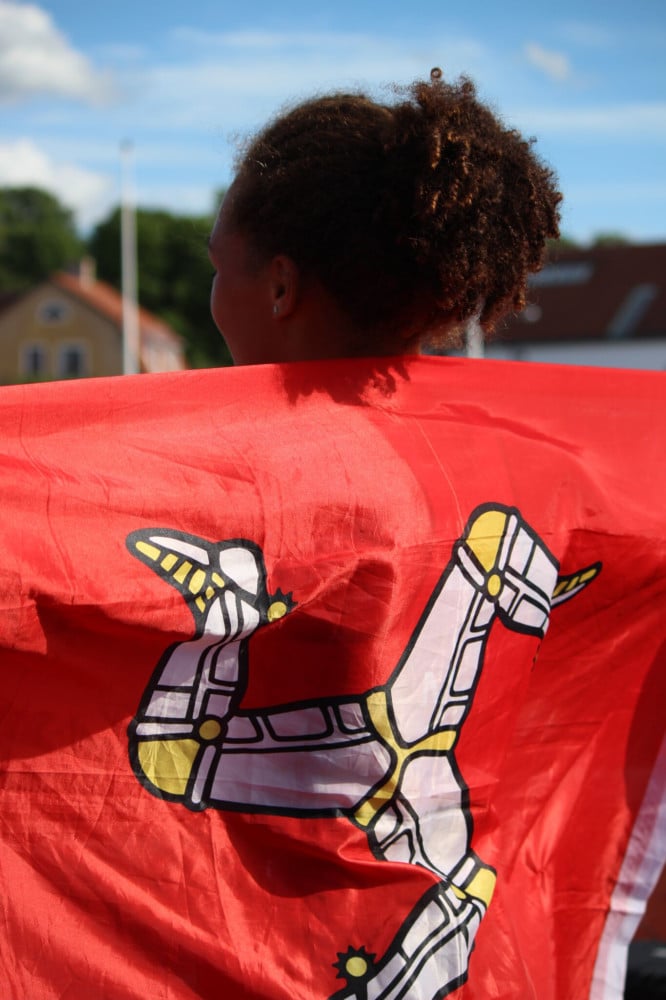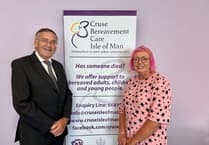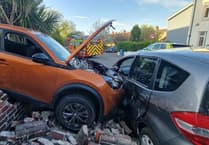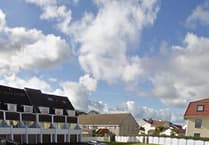The issue of racism in the island has been raised recently with a peaceful demonstration as part of the global Black Lives Matter (BLM) movement.
Here, Catherine Reid, 22, talks about what it was like to grow up in the Isle of Man as a mixed-race woman.
The island athlete, who formerly attended Castle Rushen High School, moved to the island from Derby at the age of one. She was born to a Jamaican mother and white British father.
Catherine was prompted to write a post on social media after American man George Floyd’s death. In it she discussed some of the challenges that she had faced here and elsewhere. We asked her more on this:
1) What was the moment that sparked you to write your post?
This is not something that has come from out of the blue. Back in sixth form, I took a creative writing class. The main theme of all of my work for my first year was Black Lives Matter (BLM) content.
This all came off the back of the events that happened in Ferguson, Missouri that year - the death of Michael Brown, an 18-year-old black boy, who was shot six times through his chest by a police officer, Darren Brown.
I was so enraged and I felt so helpless.
Ever since then, I have become a lot more in tune with BLM content.
I have seen countless names of innocent black people turn into hashtags. But the names kept mounting, and with every new name comes a heavier heart.
I cannot even begin to explain the pain and sheer despair of watching video footage or seeing pictures of black
people being beaten, lynched, killed. It truly breaks me every time.
The post that I published on June 1 arose from another incident that I witnessed - seeing the harrowing footage of George Floyd being murdered on May 25.
Police officer Derek Chauvin held his knee on Floyd’s neck for eight minutes and 46 seconds.
Floyd begged for his life, shouting "Please, I can’t breathe!", "Don’t kill me". His pleas were met with nothing but silence.
Chauvin did not take his knee off Floyd’s neck until he was long dead. All this while three other officers stood by and watched.
The black Instagram and Twitter community rushed together. Petitions were made, demanding justice for Floyd and for the officers involved to be charged with his murder.
At first, efforts didn’t seem to be coming to any fruition. But as of today (June 4), Chauvin is now being charged with second-degree murder and all officers involved have now been charged.
There are still protests that the charges are upgraded further.
But it isn’t like this for every victim. There are still many cases where the officers still walk free.
And that raises the question: how many black lives need to be taken for there to be a change in the policing system that is obviously designed to work against black people?
How long can it go on where black people are the only ones shouting for their right to a fair life?
That is why I wrote my post. I didn’t do it for sympathy on my part. I did it for George Floyd. I did it for Michael Brown. I did it for Tamir Rice, the 12-year-old boy who was shot by police officers while playing in his local park.
I did it for every black person who has been turned into a hashtag. I did it so that readers and the wider community can start an honest conversation about racism, and how to combat it.
2) Tell us about where you born and when had you lived in the Isle of Man, UK and USA?
I was born in Derby in 1998. My family moved over to the island for my dad’s job around three months or so after I was born, so every memory I have regarding my childhood and growing takes place on the Isle of Man.
I went through all my schooling on the island. I went to Rushen Primary School and then moved up to Castle Rushen, and stayed there for my A-Levels.
While I was in my final year of A-Levels, I got an offer from the University of Georgia (Athens, GA) to take up my studies there.
I packed up my life and moved there in August 2016 to train for my athletics and study. I stayed there until December 2017. I had to return for reasons to do with my athletics, but my time in the States was truly eye-opening.
To come from such a small community and move to the south of America was a change I don’t think anyone could have prepared me for.
On my return to the island, I took on multiple jobs and started saving money. I knew I would be moving off the island again sometime in the near future (for my athletics), so I was getting prepared for that.
I was home from December 2017 until July 2019, working and training. Then in July 2019, I moved back over to England. I am still based here now.
3) Did you notice a lot of differences in the way people treated you in these countries - could you describe this?
As I explained in my post, I experienced a lot of racism through my school years on the Isle of Man. Looking back now, I can see this all took place because of a severe lack of education on this matter.
People deem ’casual racism’ as socially acceptable, which it isn’t.
Just because a racist remark hides behind a joke or a lighthearted comment, it does not make it okay.
I felt very alienated throughout school, in high-school especially. I never felt like I properly fit in and this was quite hard for me, and something I didn’t have the courage to acknowledge until only recently.
I look back on my school years and as much as I remember many happy times with my friends, I also feel some type of regret. I never had a voice, and I certainly did not enjoy school as much as I could have, due to how I was treated, and the sheer energy I expended trying to make it look like I fit in.
I have had other encounters with racism on the Isle of Man. Last year when I worked at South in Port Erin, threats were sent into the owners on a day where they had organised for Jamaican food to be catered in the restaurant by a black-owned business.
This terrified me, as I genuinely believed that my safety (and others) was at risk while being in work that day.
I have been called names, ’blackie’, ’monkey’, ’mix-and-match’, and the N-word. I have been asked if I knew where to acquire recreational drugs from, and when I asked "Why would I know that?", I got the response, "You look like the type".
The name-calling is hurtful. The stereotypes and assumptions are exhausting. It’s hard to articulate how they make you feel. Every name and presumption chips away at your self-esteem more and more.
In Georgia, I cannot recall anything severe directed specifically towards me.
However, I did witness a lot. On my first week of arriving in the States, a black team-mate of mine warned me "Be sure you don’t jaywalk when you’re downtown. If the police see black people jaywalking, they make sure they do something about it".
This was my first introduction to the new world that I was living in, and I was petrified. I was automatically wary of the police.
I had been following the BLM movement in America for some time, and I knew that if I ever ended up in the wrong place at the wrong time, my life could be in jeopardy.
I never went out to clubs downtown (entry and drinking age was 21) for fear of getting caught and questioned by police.
I lived my life very carefully over there, making sure to abide by all rules and be a model student/athlete. I wanted no risk at all.
I think I was lucky to be on a track and field team that had a large community of black athletes. I felt like I had found a real home with these people. I wasn’t alone anymore.
I wasn’t the only one fighting the fight. I wasn’t the only person in my corner, I had a whole team. This is something I will always treasure from my time in America.
In England, I have had quite a few incidents. I have had people refuse to be served by me at work (Argos) because of the colour of my skin.
Customers have directly told me "I would rather be served by someone white". I have been called names. I have been told that my hair is unprofessional. And of course, I have fallen victim to ’casual racism’.
The ways racism is launched on you can change, but the pain it leaves never dims. It’s a sheer hurt and distress.
4) What do you think the island can do specifically about the issue of racism?
It needs to be spoken about more, but before that can happen efficiently and effectively, we need more education on the subject.
Looking at messages that I have received over the last few days, a lot of other black, mixed-race and other people of colour (POC) went through the exact same experience throughout their school lives.
Why is this happening?
I would urge schools to talk about this matter more, create a safe space for children to come forward and say "I think something that a classmate has said to me is wrong".
The word ’racist’ can be very scary for a child. I would love to see teachers, parents and family members normalising this word.
It doesn’t need to be whispered, we can talk about it freely. Along with creating safe spaces to talk about this, it would be amazing to see black history being taught in history classes or PGCE lessons as, afterall it is a part of not only the island's history, but the UK too, that has got us to where we are today.
With regards to the bigger picture - racism needs to be challenged.
Far too many people on the island think they are in a safe space to show racist behaviours, whether these be blatant or in the forms of racial gaslighting and casual racism.
Let’s show them that this is not the case and that their words and actions will not pass by without challenge. The Isle of Man prides itself on being such a close-knit community, and this is a movement that will help other ethnic minority groups feel much more a part of that community.
We need to be doing more in combating racism, and that starts with voices and honest conversations. If you hear something that is wrong, speak up.
If you see something that is wrong, step in. I want to add that it is not enough to simply say "I’m not racist".
You need to be actively anti-racist. Seeking out education so you are able to talk on this matter with valid viewpoints. Promise to listen to and amplify the voices of black people. Teach other white people about the many barriers that black people have to overcome, as well as successes of black people.
And perhaps most importantly, speaking out and confronting racial injustices, especially when they are uncomfortable.
I think it is important to remember BLM is not politics or an argument to be had. It is people, fighting for their lives to be valued and their voices to be heard.
It is nothing to be offended about or challenged. It is a plain and simple fact. Black people are being killed, beaten and hunted by police. Black people are being ignored when they speak out on their experiences and feelings.
Racism is alive and booming all over the world. Black people are scared to leave their houses in fear of not making it back home. This is why black lives matter. Now and always.
5) How have people responded to your post?
There has been a real outpour of sympathy and apologies, which really was not the aim of the post. Consolation doesn’t actively do anything to help me, or anyone in the black community.
We need more than that.
The post aims to raise awareness of the ongoing struggles that black people face and to educate people about how to use their white privilege to become an advocate and a voice for black people.
There have been a lot of people commenting on my post saying "I have never seen racism on the Isle of Man", but everyone who is saying that is white.
Reni Eddo-Lodge uses a great anecdote in her book ’Why I’m No Longer Talking To White People About Race’ that I believe will put this into perspective.
Reni explains that she once faced a long commute to work, so to cut costs she decided to take the train part of the way and cycle the rest.
It wasn’t until she started taking her bike onto public transport that she realised how inaccessible it was. A lack of ramps and lifts that would make it near impossible for wheelchair users or persons with mobility issues to get around with ease.
It wasn’t until she was directly involved with the issue that it became something she could see was a real obstacle for others in their day to day life.
So when people say "I have never seen racism on the island", that is because those people have never had to be the victim and they never will.
It’s easy to say something isn’t a problem where it doesn’t directly infringe on your life, feelings and social encounters.
Many people have said they are sorry for what I’ve gone through.
If all you’ve done is post a comment to tell me that you are sorry for what I went through and then sat back and not thought of it again, you haven’t helped.
Instead of saying you are sorry, do something to ensure this doesn’t keep happening. Invest some time and energy into fighting this.
Have conversations with your family about racism. Read an article. Educate yourself. Sign a petition. Please.
Thankfully, there has also been a mass of people messaging me saying they want to be a voice in this. They want to be an advocate for black people. They want to learn how to use their white privilege to help educate others. This is the exact response I was looking for.
I urge people to follow suit and want to learn more, to talk more, to fight more, to use their privilege and platform to help black people. Don’t let any racist person be comfortable with their prejudice.
Challenge and question any racism you see.
There are so many resources for people to go and educate themselves more on this matter - films, podcasts, books.
I ask that people go away and take the time to watch, listen or read something that will enlighten them more on this matter.
The more educated we become, the more you will be able to notice, confront, challenge and put a stop to racism.



.jpeg?width=209&height=140&crop=209:145,smart&quality=75)
